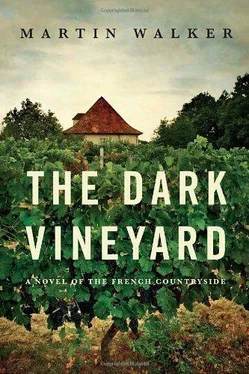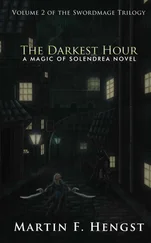Martin Walker - The dark vineyard
Здесь есть возможность читать онлайн «Martin Walker - The dark vineyard» весь текст электронной книги совершенно бесплатно (целиком полную версию без сокращений). В некоторых случаях можно слушать аудио, скачать через торрент в формате fb2 и присутствует краткое содержание. Жанр: Полицейский детектив, на английском языке. Описание произведения, (предисловие) а так же отзывы посетителей доступны на портале библиотеки ЛибКат.
- Название:The dark vineyard
- Автор:
- Жанр:
- Год:неизвестен
- ISBN:нет данных
- Рейтинг книги:5 / 5. Голосов: 1
-
Избранное:Добавить в избранное
- Отзывы:
-
Ваша оценка:
- 100
- 1
- 2
- 3
- 4
- 5
The dark vineyard: краткое содержание, описание и аннотация
Предлагаем к чтению аннотацию, описание, краткое содержание или предисловие (зависит от того, что написал сам автор книги «The dark vineyard»). Если вы не нашли необходимую информацию о книге — напишите в комментариях, мы постараемся отыскать её.
The dark vineyard — читать онлайн бесплатно полную книгу (весь текст) целиком
Ниже представлен текст книги, разбитый по страницам. Система сохранения места последней прочитанной страницы, позволяет с удобством читать онлайн бесплатно книгу «The dark vineyard», без необходимости каждый раз заново искать на чём Вы остановились. Поставьте закладку, и сможете в любой момент перейти на страницу, на которой закончили чтение.
Интервал:
Закладка:
Bruno had to smile, she was so young and fiery. “You should go into politics. I’d vote for you, Dominique. We need some of that passion around here.”
She grinned at him, suddenly looking even younger. “You think I’m passionate? You ought to hear Max.”
“You two are still friends, even with you at school in Grenoble and him in Bordeaux?”
“We talk most days-we e-mail and text. We’re in the same chat forums on ecology. He’s really into organics, not surprisingly since he grew up on the commune. His dad, Alphonse, was the first real Green I ever met.”
“Did you tell Max about the GMO crops?” Bruno asked, keeping his voice light.
“Not exactly,” she said hesitantly, choosing her words carefully. “Well, not in so many words. We were having an argument about GMOs and I was saying my views had changed, now that I’d been working with them. And he knew where I was working this summer, so I suppose he could have figured it out.”
“What about his views? Is Max still against GMOs?” His question jolted her, and he could feel Stephane start to eye him quizzically.
“You’d better ask him, Bruno,” she said. “This is beginning to sound like you suspect something here. You’re not going to start behaving like a cop, are you?”
“Come off it, Dominique,” he said. His affection for her helped damp down the irritation tinged with guilt that came when friendship interfered with police work. He had known this girl since before she wore braces on her teeth. He smiled at her, gaining a little time as he wondered how to make her realize how serious this could be.
“I’ve been a policeman for as long as you’ve known me, which is most of your life,” he said. “But I work for Saint-Denis, not for anybody else, and there are some much tougher policemen down here under pressure to make an arrest. The chief detective of the department for one, and I wouldn’t be surprised to see some security people down from Paris. And you’ll be right in their sights. You worked at the station, you knew about the GMO crops, your dad’s farm could have been at risk, you’re a passionate ecolo. You’re an obvious suspect. And arson means a prison term.”
“Are we going to need a lawyer, Bruno?” asked Stephane. At least he understood.
“Not yet, but I’ll let you know. And in the meantime, if you have any documents that show you’re not against GMOs, this would be a good time to get them together.”
“That I can do,” Dominique said thoughtfully, sobered by his speech. “We had a whole debate about them in our chat group, and I wrote a piece about them for Grenoble Vert, the Green newsletter at the university. But what about Max? What should I tell him?”
“That’s up to you. He didn’t work at the station, so there’s no reason for him to come under suspicion. But you’re in a very different situation. What’s the name of that chat group, by the way?”
“Aquitaine Vert, the same as the organization. It just sort of grew out of their Web site, and I’ve been in it since I’ve been at school. Well, thanks for the warning. But I haven’t done anything wrong, so I’ll be fine.”
“Whatever you wrote for that newsletter, e-mail a copy to me, just in case. It might come in handy,” said Bruno, closing his notebook. “By the way, you might like to know that your boss thinks very highly of you. Petitbon told me earlier that he’d like to offer you a permanent job once you get your diploma.”
“So he must be sure I had nothing to do with it.”
“Right-you’ve got a witness for the defense already,” Bruno said with a grin. “Along with me, of course.”
In a slightly easier frame of mind, Bruno went on to his next errand, wondering who the dead woman might be who had given Alphonse’s commune as her address. Her name had provided no clue and there were no records of her at the mairie. If she had been here, it had been before Bruno’s arrival a decade ago. Bruno took the back road toward Saint-Denis over the railway crossing, skirting the new cemetery and turning onto the small single-track lane that led out of the town and up the hill to the water tower. Beyond it lay the rolling wooded countryside, where the hay was freshly harvested and the golden Limousin cattle grazed contentedly in the early September sun. He drove on up the gentle slope to the high plateau, where the land was cheap and the farming difficult. Bleak and windswept in winter, these high lands had a certain austere grandeur now at the tail end of summer, and spectacular views over the river valleys on either side.
Farther along the ridge, standing watch over the confluence of the rivers, were the ruins of the Chateau de Brillamont, the nearest to Saint-Denis of the chain of medieval fortresses that marked the shifting frontier between the English and the French. Their war had lasted more than a hundred years, until Jeanne d’Arc restored the French morale and Bertrand du Guesclin devised an artillery train that was light enough to be moved and heavy enough to batter the English castles into submission. Despite what he had been told in school of the national heroine, Bruno knew from his army days that it was the gunpowder that had won decisive victory. It usually was.
8
Bruno turned off at a half-rotted and illegible wooden sign that pointed to a primitive road. He heard the blades of grass between the tire treads swish against the bottom of his van as he followed the lane through an avenue of trees into a broad and protected hollow. He sounded his horn as he came to a wooden gate across the lane, turned off the ignition and walked alongside a large and well-kept vegetable garden. It led toward the curious assortment of buildings that faced the sun from the northern slope of the hollow. A woman he recognized was weeding, while two of the children from his tennis class were picking tomatoes. Briefly he paused at the sturdy fence of chicken wire that surrounded the plot, greeted the woman and children and accepted a gift of two plump and perfect cherry tomatoes.
“Salut, Bruno. What brings you up here?” called Celine, a grandmotherly type who had been with the commune from the beginning. “Have you come to help?”
“I’m too busy with my own garden these days, Celine. Is Alphonse around?”
“In the cheese barn.”
Bruno nodded and turned away to view the small village that the young revolutionaries of 1968, the soixante-huitards, had built in the nearly four decades since their arrival. Even if he had not known the steady output of healthy and well-mannered youngsters they had sent through the schools and sports clubs of Saint-Denis and seen Alphonse elected as the first Green member of the town council, he would have been impressed. In pride of place stood a traditional stone farmhouse, with ivy covering most of the side wall. It was topped with the usual red tile roof shaped like a witch’s hat native to this part of Perigord. Beside it stood a tall and spindly windmill that seemed to provide enough power for the needs of the dozen or so people who usually lived here. Closer to Bruno and the lane stood a large log cabin with a shaded porch, on which a middle-aged woman with long straight hair sat cross-legged, her eyes closed and her back straight. The gaps between the logs were stuffed with clay, and the roof was composed of two layers of planks separated by thick sheets of polystyrene foam, all covered by solar panels to heat water.
Then came a wide and deceptively large building that Bruno knew from previous visits to be constructed of homemade bricks of mud and straw; it was covered with earth and dug into the side of the hill so that the doors and windows appeared to peek out from the living turf. A goat grazed on the roof, and two children were seated on benches in front of the building, where they appeared to be playing chess. To the right was the barn, a simple but sturdy A-frame made of abandoned planks of wood and some salvaged iron piping welded into bracing triangles for strength. Bruno’s favorite building was the dome, perched on the grass like half of a gigantic multicolored golf ball, composed of triangles, some of glass, some of wood painted in various hues, some of plastic and some of shards of mirror.
Читать дальшеИнтервал:
Закладка:
Похожие книги на «The dark vineyard»
Представляем Вашему вниманию похожие книги на «The dark vineyard» списком для выбора. Мы отобрали схожую по названию и смыслу литературу в надежде предоставить читателям больше вариантов отыскать новые, интересные, ещё непрочитанные произведения.
Обсуждение, отзывы о книге «The dark vineyard» и просто собственные мнения читателей. Оставьте ваши комментарии, напишите, что Вы думаете о произведении, его смысле или главных героях. Укажите что конкретно понравилось, а что нет, и почему Вы так считаете.












